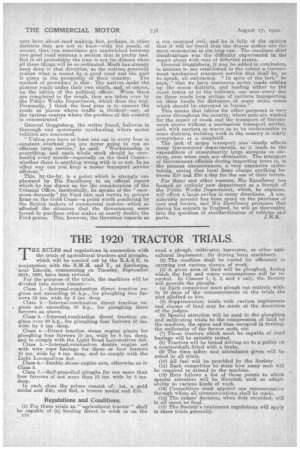THE 1920 TRACTOR TRIALS.
Page 12

If you've noticed an error in this article please click here to report it so we can fix it.
THE RTTLES and regulations in connection with the trials of agricultural tractors and ploughs, which will be carried out by the R.A.S.E. in conjunction with the S.M.M. and T. at Aisthorpe, near Lincoln, commencing on Tuesday, September 28th, 1920, have been revised.
For the purpose of the trials, the machines will be . divided into seven classes:— Class 1.—Internal-combustion direct traction engines not exceeding 24 h.p., for ploughing two furrows 10 ins. wide by 6 ins. deep.
Class 2.----Internal-combustion direct traction engines not exceeding 30 h.p., for ploughing three furrows as above.
Class 3.—Internal-combustion direct traction engines over 30 h.p., for ploughing four furrows 10 ins. wide by 8 ins. deep.
Class 4.—Direct traction steam engine plants for ploughing four furrows 10 ins, wide by 8 ins, deep, and to comply with the Light Road Locomotives Act. Class 5.—Internal-combustion double engine set with wire rope haulage for three or four furrows 10 ins, wide by 8 ins, deep, and to comply with the Light Locomotives Act.
Class 6.—Double steam engine sets, otherwise as in Class 5.
Class 7.—Self-propelled ploughs for not more than four furrows of not more than 10 ins, wide by 8 ins. deep.
In each class the prizes consist of : 1st, a gold medal and £20, and 2nd, a bronze medal and 210.
Regulations and Conditions.
(1) For these trials an " agricultural tractor" shall be capable of (a) hauling direct in work or on the ol0 road a plough, cultivator', harvester, or other agri. cultural implement ; (b) driving barn machinery. (2) The machineshall be tested for efficiency in carrying out various classes of work. (3) A given area of land will be ploughed, during which the fuel and water consumptions will be recorded. In Classes 1, 2, 5, and 4 only, the Society will -provide the ploughs. (4) Each competitor must plough out entirely within 10 days of the commencement of the trials the plot allotted to him. (5) Supplementary trials with various implements and classes of land may be made at the discretion of the judges. (6) Special attention will be paid in the ploughing and cultivating trials to the compression of land by the machine, the space and time occupied in turning, the uniformity of the furrow ends, etc. (7) Those tractors which must be capable of road haulage will be suitably tested. (8) Tractors will be tested driving on toa pulley on a countershaft fitted with a brake.
(9) The time taken and attendance given will be noted in all trials.
(10) All fuel will be provided by the Society. (n) Each -competitor to state how many men will be required to attend to the machine.
(12) Here follows a list of those points to which special attention will be directed, such as adaptability to various kinds of work. (13) Competitors must appoint one representative through whom all communications shall be made. (14) The judges' decision, when duly recorded, will in all eases be final.
(15) The Society's implement regulations will apply in these trials generally.




























